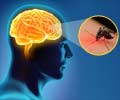A cost-effective and less hazardous biosensor for detecting the Japanese Encephalitis Virus (JEV) has been developed by researchers.

‘The Japanese Encephalitis Virus is the leading cause of mosquito-borne encephalitis in South-East Asia and Western Pacific and is often misdiagnosed as dengue. JEV belongs to the family Flaviviridae and genus Flavivirus and exists in a zoonotic cycle. Since there is no cure available for JEV, early detection is essential to mitigate a breakout.’





"Since the conventional methods for JEV diagnosis are expensive, more hazardous and time-consuming diagnostic techniques and require an elaborate laboratory set up and trained expertise, this biosensor may be able to overcome these limitations," it said. Detection of the NS1 instead of antibody has an added advantage since the antigen is present from day one of the infection and hence facilitates early detection. On the other hand, antibodies appear only after day 4/5 of the infection.
Docking studies were used to identify the specificity of the epitopes for different flaviviral NS1 with JEV NS1 antibody paratopes, followed by JEV NS1 sequence amplification, cloning and transformation, the release added.
Source-IANS















